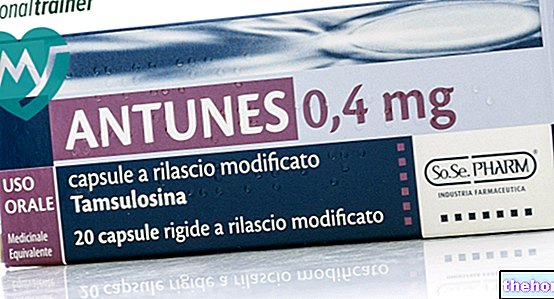Active ingredients: Trimipramine
Surmontil 25 mg film-coated tablets
Surmontil 100 mg film-coated tablets
Surmontil 40 mg / ml oral drops, solution
Why is Surmontil used? What is it for?
Surmontil contains trimipramine, which belongs to a class of medicines called 'tricyclic antidepressants'.
Surmontil is indicated to treat:
- depression, mainly when accompanied by sleep disturbances, anxiety, agitation
- neurosis (anguish, fear, hysterical, obsessive).
Contraindications When Surmontil should not be used
Do not take Surmontil
- if you are allergic to trimipramine, similar medicines or any of the other ingredients of this medicine (listed in section 6);
- if you suffer from an eye disease called "glaucoma";
- if you suffer from a prostate disease called "prostatic hypertrophy";
- if you suffer from severe muscle weakness (myasthenia gravis);
- if you are pregnant or think you are (see "Pregnancy and breastfeeding");
- if you are in the recovery period after having a heart attack;
- if you suffer from severe liver disease (liver disease).
To avoid even serious side effects (up to seizures, coma and death), your doctor will not prescribe Surmontil together with other medicines used for depression called "monoamine oxidase inhibitors" or before it has been at least two weeks after "stopping a treatment with these medicines (see "Other medicines and Surmontil").
If you need to have surgery, your doctor will make you stop taking Surmontil at least 5 days before.
Precautions for use What you need to know before taking Surmontil
Use Surmontil under the direct supervision of your doctor.
It is important that you read this section carefully if you are to take this medicine.
Talk to your doctor or pharmacist before taking Surmontil.
Your doctor will take special care if:
- have a history of epilepsy or seizures;
- have heart problems, especially if you are elderly;
- have a "blockage of the blood vessels of the brain (cerebral arteriosclerosis);
- have had problems with urine retention or obstruction of the bowel or narrowing of part of the stomach (pyloric stenosis);
- have severe kidney problems;
- you have a gland called a thyroid that works excessively (hyperthyroidism);
- you are taking thyroid hormones.
Surmontil, like all "tricyclic antidepressant" medicines, is associated with a risk of side effects to the heart and circulation at any age.
Interactions Which drugs or foods can modify the effect of Surmontil
Tell your doctor or pharmacist if you are using, have recently used or might use any other medicines.
The combination of Surmontil and the following medicines requires special caution and vigilance on the part of your doctor as it may cause you side effects:
- Other medicines used for mental illness (psychiatric drugs).
- Medicines that block a substance in the body called acetylcholine (anticholinergics).
- Medicines used for allergies (antihistamines).
- Medicines that act on a part of the nervous system called the 'sympathetic nervous system' (sympathomimetics).
- Medicines that act on a substance in the body that serves to regulate your mood called "serotonin" (such as selective serotonin inhibitors, mono amino oxidase inhibitors, lithium, triptans, tramadol, linezolid, L-tryptophan and herbal preparations John's: Hypericum perforatum), as they can lead to a number of symptoms called "serotonin syndrome" (see "Warnings and precautions").
- Medicines that cause an "alteration of the heart beat called" prolongation of the "QT interval", (such as Class IA and III antiarrhythmics that act on heart beats, some antibiotics such as macrolides and fluoroquinolones, some medicines that act on infections caused by mushrooms, some medicines that act on diseases of the mind such as antipsychotics).
- Medicines that cause a decrease in potassium in the blood (such as hypokalaemic diuretics used for blood pressure, stimulant laxatives, glucocorticoids and tetracosactides, products used in the diagnosis of certain diseases).
- Medicines that cause the heart to beat slower called bradycardia (such as beta blockers, diltiazem, verapamil, clonidine and digitalis, used to treat high blood pressure or certain heart diseases, see "Warnings and precautions").
Surmontil may block the blood pressure lowering effect of some medicines (such as guanethidine and similar medicines, methyldopa and reserpine).
Surmontil with food, drink and alcohol
Avoid the use of alcoholic beverages while taking Surmontil as Surmontil may increase the effects of alcohol.
Warnings It is important to know that:
Surmontil and thoughts of suicide / suicide.
Particular attention should be paid during treatment with Surmontil if you:
- have had suicidal attempts or thoughts about suicide in the past or before starting treatment with Surmontil;
- you are starting treatment with Surmontil or your doses have been changed.
In these cases you have a higher risk of developing suicidal thoughts or attempting suicide, especially if you are a patient at a young age (less than 25 years).
Warn, or your carer should tell your doctor immediately if your symptoms get worse, if you have thoughts of suicide or if you notice changes in your behavior.
Surmontil and increased blood sugar values or in patients with diabetes.
If you have been diagnosed with diabetes or have risk factors for diabetes, your doctor will order you to have blood tests to check your sugar (blood sugar) levels, as the use of tricyclic antidepressants increases the risk of diabetes. (see "Possible Side Effects").
Surmontil and other mood-modifying medicines (serotonin syndrome).
If you take Surmontil (tricyclic antidepressant) together with other medicines that act on a substance in the body called "serotonin", which serves to regulate your mood, you may have a number of symptoms called "serotonin syndrome" (see "Other medicines and Surmontil") "Serotonin syndrome", which is caused by an excess of the substance serotonin in the blood, can lead to death, and includes the following symptoms:
- increased reflexes (hyperreflexia), sudden and involuntary jerks of the muscles (clonus and myoclonus), stiffness;
- increased body temperature (hyperthermia), rapid heartbeat (tachycardia), changes in blood pressure, increased sweating (diaphoresis), tremor, hot flashes, dilated pupils, diarrhea;
- altered mental status: anxiety, agitation, confusion, coma.
Your doctor will monitor you carefully if you take Surmontil together with medicines that affect serotonin and if you have the symptoms of 'serotonin syndrome', he will stop taking Surmontil.
Surmontil and altered heart beat (QT prolongation).
Like other tricyclic antidepressants, Surmontil can lead to an "abnormal functioning of the heart called" prolongation of the "QT interval" (see "Possible side effects").
Particular attention should be paid to taking Surmontil if you are at risk of QT interval prolongation if:
- have suffered from long QT syndrome since birth, or have decreased heart rate (bradycardia);
- you are using medicines that are known to prolong the QT interval, to cause decreased heart beat (bradycardia) or decreased potassium levels in the blood (hypokalemia) (see "Other medicines and Surmontil");
- you suffer from an imbalance of salts in your blood which has not been corrected (e.g. decrease in potassium, decrease in magnesium).
Children and adolescents
Surmontil, like other tricyclic antidepressants, should not be used in children and adolescents under 18 years because:
- efficacy has not been demonstrated for this class of medicines;
- the use of other antidepressants has been correlated with the risk of suicide, self-harm and hostility and this risk may also occur with Surmontil;
- There are no safety data available regarding the growth, maturation and development of mental and behavioral skills for prolonged treatment with Surmontil in children and adolescents.
Pregnancy and breastfeeding
If you are pregnant or breast-feeding, think you may be pregnant or are planning to have a baby, ask your doctor or pharmacist for advice before taking this medicine.
Pregnancy
Do not use Surmontil if you are pregnant or suspect that you are pregnant.
Feeding time
If you are breast-feeding do not use Surmontil, as the medicine passes into breast milk.
Driving and using machines
Use particular caution in activities that require a continuous state of alertness and alertness such as driving and using machines especially in the first days of treatment with Surmontil.
Surmontil film-coated tablets contain lactose and castor oil.
If you have been told by your doctor that you have an intolerance to some sugars, contact your doctor before taking this medicine. Castor oil can cause stomach upset and diarrhea.
Surmontil oral drops, solution contains sucrose and ethanol.
If you have been told by your doctor that you have "intolerance to some sugars, contact your doctor before taking this medicine. Sucrose may be harmful to your teeth. This medicine contains 11.5% by volume of ethanol (alcohol), for example up to at 727.5 mg for a dose of 300 mg of trimipramine, equivalent to 17.2 ml of beer or 8.6 ml of wine. It can be harmful to alcoholics, pregnant or breastfeeding women, children and people with liver disease or epilepsy.
For those who carry out sporting activities, the use of medicines containing ethyl alcohol can cause positive doping tests due to the alcohol concentration limits indicated by some sports federations.
Dosage and method of use How to use Surmontil: Dosage
Always take this medicine exactly as your doctor or pharmacist has told you. If in doubt, consult your doctor or pharmacist.
Mild and moderate depressions in non-hospitalized patients.
The recommended dose is:
- 50 mg in the evening, two hours before bedtime.
- Your doctor may decide to increase the dose to 75-100 mg if you have severe sleep disturbances.
Your doctor will allow you to continue the treatment for at least 3 weeks.
Severe and moderate depression in hospitalized patients.
The recommended dose is:
- at the beginning of treatment: 75 mg per day in the evening, or 25 mg at noon and 50 mg in the evening.
Your doctor will progressively increase the dose usually up to 150-300 mg per day, and the treatment will be continued for 4-6 weeks.
Once the desired effect is achieved, your doctor will reduce your dose to the maintenance dose of 75-150 mg per day for 2-3 months.
Administration of most of the total daily dose in the evening reduces the need for sleep medications (hypnotics) and daytime sleepiness.
If you suffer from mood swings (cyclothymia) with depressive states that recur periodically, your doctor may decide to continue maintenance therapy for a year or longer.
Use in the elderly
If you are elderly, your doctor will determine the dose to take and decide whether to reduce the dose generally used.
Instructions for use of Surmontil drops
Surmontil oral drops, solution:
- remove the cap;
- keep the bottle upside down;
- if necessary, lightly tap the bottle with your finger initially.
ATTENTION: The bottle has a closure that is difficult to open for children.
If you forget to take Surmontil
Do not take a double dose to make up for a forgotten dose.
If you stop taking Surmontil
If you have any further questions on the use of this medicine, ask your doctor or pharmacist.
If you abruptly stop taking Surmontil you may have symptoms essentially characterized by relapse of the disease with malaise, nausea, headache and muscle pains.
Overdose What to do if you have taken too much Surmontil
In case of accidental ingestion / intake of an overdose of Surmontil, notify your doctor immediately or go to the nearest hospital. If you have any further questions on the use of Surmontil, ask your doctor or pharmacist.
Intake of excessive doses is manifested by:
- decrease in blood pressure (hypotension) and / or collapse;
- convulsions;
- coma;
- disturbances in heart beat (prolongation of the QT interval, torsades de pointes.
Taking too much of the medicine (overdose) can lead to death.
Side Effects What are the side effects of Surmontil
Like all medicines, this medicine can cause side effects, although not everybody gets them.
The most common undesirable effects are:
- dry mouth (dry mouth),
- difficulty seeing clearly (accommodation disorders),
- dilation of the pupil (mydriasis),
- constipation (constipation),
- tiredness (asthenia),
- changes in the heart rate (tachycardia, palpitations),
- dizziness,
- buzzing,
- headache (headache
- drowsiness.
An increased risk of bone fractures has been observed in patients taking this type of medicine.
Following the use of high doses of Surmontil you may have:
- mild or severe and persistent tremors,
- movement disorders (ataxia, motor incoordination),
- changes in sensation (paraesthesia),
- alteration of the nerves (peripheral neuropathies),
- allergies with skin disorders,
- increased sensitivity to light (photosensitization),
- swelling (edema) of the face and tongue.
Exceptionally it could have:
- breast growth (gynecomastia) in men,
- milk production outside breastfeeding (galactorrhea) in women.
It may also have:
changes in your depression into arousal, if you suffer from certain mental disorders (paranoia or sub-delirium states), especially if you are elderly, with confusional states, hallucinations, anxiety and insomnia. If you have these problems, please contact your doctor who will determine the appropriate treatment.
In rare cases, changes in the electroencephalogram (EEG), a test that records the activities of the brain, have been observed.
The following symptoms have occasionally been reported with some medicines of the same class as Surmontil ("tricyclic antidepressants"), mostly in cases of too high doses:
- disorders affecting the digestive system such as nausea, vomiting, diarrhea, inflammation of the mouth (stomatitis), inflammation of the glands in the mouth (sublingual or parotid adenitis), abdominal pain, yellowing of the skin and eyes (jaundice),
- decrease in the number of certain blood cells (agranulocytosis),
- red patches of the skin (thrombocytopenic purpura),
- retention of urine,
- occlusion of the intestine (paralytic ileus),
- hair loss (alopecia),
- changes in sexual desire,
- changes in body weight or blood sugar (blood sugar) values,
- heart and circulation disorders, especially in the elderly: changes in the electrocardiogram and other heart disorders, including heart attack, stroke,
- rare cases of desire or attempted suicide (see "Warnings and precautions").
Other side effects are:
- nutrition disorders
- increased blood sugar levels (hyperglycaemia), increased risk of diabetes (see "Warnings and precautions"),
- heart disease such as altered heart beat (prolongation of the QT interval, torsades de pointes, see "Warnings and precautions").
Compliance with the instructions contained in the package leaflet reduces the risk of undesirable effects.
Reporting of side effects
If you get any side effects, talk to your doctor or pharmacist. This includes any possible side effects not listed in this leaflet. You can also report side effects directly via the national reporting system at: http://www.agenziafarmaco.gov.it/it/responsabili. By reporting side effects you can help provide more information on the safety of this medicine. .
Expiry and Retention
This medicine does not require any special storage conditions.
Keep this medicine out of the sight and reach of children.
Do not use this medicine after the expiry date which is stated on the carton after "EXP".
The expiry date refers to the last day of that month.
Do not throw any medicines via wastewater or household waste. Ask your pharmacist how to throw away medicines you no longer use. This will help protect the environment.
Deadline "> Other information
What Surmontil contains
Surmontil 25 mg film-coated tablets
- The active ingredient is: trimipramine maleate. Each tablet contains 35 mg of trimipramine maleate equivalent to 25 mg trimipramine.
- The other ingredients are: lactose monohydrate, maize starch, pregelatinised maize starch, polyvinylpyrrolidone, magnesium stearate, zein, castor oil.
Surmontil 100 mg film-coated tablets
- The active ingredient is: trimipramine maleate. Each tablet contains 140 mg trimipramine maleate equivalent to 100 mg trimipramine.
- The other ingredients are: lactose monohydrate, maize starch, pregelatinised maize starch, polyvinylpyrrolidone, magnesium stearate, zein, castor oil.
Surmontil 40 mg / ml oral drops, solution
- The active ingredient is: trimipramine mesylate. 100 ml of solution contain 5.305 g of trimipramine mesylate equal to 4.0 g trimipramine.
- The other ingredients are: sucrose, glycerol, citric acid, ascorbic acid, E 150, cream flavor, alcohol, purified water.
What Surmontil looks like and contents of the pack
Surmontil comes in the form of:
film-coated tablets:
- box of 50 tablets of 25 mg
- box of 20 tablets of 100 mg
- oral drops, solution:
- bottle of 20 ml at 4% (1 mg / drop).
Source Package Leaflet: AIFA (Italian Medicines Agency). Content published in January 2016. The information present may not be up-to-date.
To have access to the most up-to-date version, it is advisable to access the AIFA (Italian Medicines Agency) website. Disclaimer and useful information.
01.0 NAME OF THE MEDICINAL PRODUCT -
SURMONTIL
02.0 QUALITATIVE AND QUANTITATIVE COMPOSITION -
100 ml of solution (drops) contain:
Active principle
Trimipramine mesylate 5.305 g
equal to Trimipramine 4.0 g
(1 drop = 1 mg of trimipramine).
Excipients with known effects:
Sucrose 30 g, Ethyl alcohol 96% 12 ml.
For the full list of excipients, see section 6.1.
03.0 PHARMACEUTICAL FORM -
Film-coated tablets - Oral drops, solution.
04.0 CLINICAL INFORMATION -
04.1 Therapeutic indications -
Depressive syndromes, mainly when accompanied by sleep disturbances, anxiety, agitation; neurosis (anxiety, phobic, hysterical, obsessive).
04.2 Posology and method of administration -
Mild and moderate depressions in outpatients: the recommended dosage is 50 mg in the evening, two hours before bedtime, which can be raised to 75-100 mg in patients with severe sleep disturbances. Treatment should be continued for at least 3 weeks.
Severe and moderate depression in hospitalized patients: start treatment with 75 mg / day in the evening, or 25 mg at noon and 50 mg in the evening. Useful doses, generally 150-300 mg per day, should be achieved progressively and treatment continued for 4-6 weeks. After achieving the desired effect, reduce the dosage to the maintenance dose of 75-150 mg per day for 2-3 months. Evening administration of the majority of the total daily dose reduces the need for hypnotics and daytime sleepiness.
In cyclothymic patients with recurrent depressive states, maintenance therapy can be continued for one year or longer.
In the treatment of elderly patients, the posology must be carefully established by the doctor who will have to evaluate a possible reduction of the dosages indicated above.
04.3 Contraindications -
Hypersensitivity to the active substance or to any of the excipients listed in section 6.1.
Cases of cross-allergenicity with other drugs with similar chemical structure have been reported. Glaucoma. Prostatic hypertrophy. Myasthenia gravis. Known or suspected pregnancy, post-infarct recovery period, severe liver disease. To avoid even serious manifestations, up to convulsions, coma and exitus, the drug must not be administered in combination with monoamine oxidase inhibitors or before at least two weeks have passed since the interruption of a previous treatment with said drugs. If surgery is necessary, the administration must be stopped at least 5 days before.
04.4 Special warnings and appropriate precautions for use -
Suicidal ideation / behavior
Suicide / Suicidal ideation
Depression is associated with an increased risk of suicidal thoughts, self harm and suicide (suicide / related events). This risk persists until significant remission occurs. As improvement may not occur during the first or immediate weeks of treatment, patients should be monitored closely until improvement occurs. It is generally clinical experience that the risk of suicide may increase in the early stages of improvement.
Other psychiatric conditions for which Surmontil is prescribed may also be associated with an increased risk of suicidal behavior. Additionally, these conditions can be associated with major depressive disorder. Therefore, the same precautions followed when treating patients with other psychiatric disorders should be observed when treating patients with major depressive disorders.
Patients with a history of suicidal behavior or thoughts, or who exhibit a significant degree of suicidal ideation prior to initiation of treatment, are at increased risk of suicidal thoughts or suicidal thoughts, and should be closely monitored during treatment. of clinical trials conducted with antidepressant drugs in comparison with placebo in the therapy of psychiatric disorders, showed an increased risk of suicidal behavior in the age group below 25 years of patients treated with antidepressants compared to placebo.
Drug therapy with antidepressants should always be associated with close surveillance of patients, particularly those at high risk, especially in the initial stages of treatment and after dose changes. Patients (or caregivers) should be advised of the need to monitor and report immediately to their physician any clinical worsening, the onset of suicidal behavior or thoughts, or changes in behavior.
The conduct of therapy must be characterized by particular caution in subjects with a history of epilepsy or convulsive episodes, in cardiac patients, especially if elderly, in cerebral arteriosclerosis, in patients with a history of urinary retention or intestinal obstruction or pyloric stenosis, in severe nephropatients, in hyperthyroid and in patients undergoing therapy with thyroid hormones. The abrupt interruption of treatment with the drug can cause symptoms, which however have not been reported to dependence, essentially characterized by a relapse with malaise, nausea, headache and myalgia.
Furthermore, tricyclic antidepressants are associated with a risk of adverse cardiovascular events in all age groups.
Use in children and adolescents under 18 years
Tricyclic antidepressants should not be used to treat children and adolescents under the age of 18. Studies conducted in depression in children of this age group have not demonstrated efficacy for this class of drugs. Studies with other antidepressants have highlighted the risk of suicide, self-harm and hostility related to these drugs. This risk may also occur with these drugs. tricyclic antidepressants.
It should be borne in mind that there are no long-term safety data available in children and adolescents regarding growth, maturation and cognitive and behavioral development.
Hyperglycemia / diabetes:
Epidemiological studies have identified an increased risk of diabetes mellitus in depressed patients receiving tricyclic antidepressants. Therefore, patients with a well-founded diagnosis of diabetes mellitus or with diabetes risk factors starting treatment with trimipramine should undergo appropriate glycemic monitoring (see section 4.8).
Serotonin syndrome:
Serotonin syndrome may occur when tricyclic antidepressants are used concomitantly with other serotonergic active substances (see section 4.5). Serotonin syndrome, which is caused by an excess of serotonin, can be fatal and includes the following symptoms:
• neuromuscular excitation (clonus, hyperreflexia, myoclonus, rigidity)
• autonomic changes (hyperthermia, tachycardia, blood pressure changes, diaphoresis, tremor, hot flashes, dilated pupils, diarrhea)
• altered mental status (anxiety, agitation, confusion, coma).
Close clinical monitoring is required when serotonergic active substances are combined with trimipramine. If serotonin syndrome occurs, treatment with trimipramine should be discontinued.
QT prolongation:
Like other tricyclic antidepressants, trimipramine may prolong the QT interval depending on the dose (see section 4.8).
Care should be taken in patients with known risk factors in prolonging the QT interval such as:
• congenital long QT syndrome, bradycardia
• concomitant use of drugs that are known to prolong the QT interval, to induce bradycardia or hypokalemia (see section 4.5)
• incorrect electrolyte imbalance (eg hypokalemia, hypomagnesaemia).
Important information about some of the excipients
SURMONTIL tablets contain lactose . Patients with rare hereditary problems of galactose intolerance, the Lapp lactase deficiency, or glucose-galactose malabsorption should not take this medicine.
SURMONTIL tablets contain castor oil. It can cause stomach upset and diarrhea.
SURMONTIL oral drops contain sucrose. Patients with rare hereditary problems of fructose intolerance, glucose-galactose malabsorption, or sucrase-isomaltase insufficiency should not take this medicine. It can be bad for your teeth.
SURMONTIL oral drops contain ethanol. This medicinal product contains 11.5% vol ethanol (alcohol), eg up to 727.5 mg for a dose of 300 mg of trimipramine, equivalent to 17.2 ml of beer or 8.6 ml of wine. May be harmful to alcoholics, and should be taken into consideration in pregnant or lactating women, children and high-risk groups such as people with liver disease or epilepsy.
04.5 Interactions with other medicinal products and other forms of interaction -
The association with other psychotropic drugs, anticholinergics, antihistamines or sympathomimetics requires particular caution and vigilance on the part of the physician to avoid unexpected undesirable effects from interaction.
The concomitant combination with other active serotonergic substances (such as SSRIs, SNRIs, MAOIs, lithium, triptans, tramadol, linezolid, L-tryptophan and St. John's wort preparations - Hypericum perforatum) can lead to serotonin syndrome (see section 4.4) Close clinical monitoring is required when these substances are administered concomitantly with trimipramine.
Trimipramine should be used with caution in patients receiving medications known to prolong the QT interval (e.g. Class IA and III antiarrhythmics, macrolides, fluoroquinolones, some antifungals, some antipsychotics), to induce hypokalemia (e.g. hypokalaemic diuretics, stimulant laxatives, glucocorticoids, tetracosactides) or bradycardia (e.g. beta blockers, diltiazem, verapamil, clonidine, digitalis) (see section 4.4).
The antihypertensive action of guanethidine and similar drugs, methyldopa and reserpine can be blocked.
The use of alcohol should be avoided during treatment because the drug can enhance its effects.
04.6 Pregnancy and breastfeeding -
Not to be used in known or suspected pregnancy. As the product passes into breast milk, its use is contraindicated in case of breastfeeding.
04.7 Effects on ability to drive and use machines -
On the part of outpatient patients and in the first days of treatment it is advisable to use particular caution in those activities that require a continuous state of alertness and alertness such as driving or using machines.
04.8 Undesirable effects -
Class dependent side effects:
Epidemiological studies, mainly conducted in patients 50 years of age and older, show an increased risk of bone fractures in patients treated with SSRIs and TCAs. The mechanism leading to this risk is unknown.
It should be borne in mind that the experience carried out with various thymoleptics and tricyclic antidepressants, considered as a whole and with particular regard to the drugs of this group that have already been used for some time, on which therefore a greater amount of information is available, has highlighted a series of side effects some reported more commonly, others only occasionally. These side effects occurred with the use of this or that drug, often administered in very high doses and sometimes without being able to ascertain a sure correlation with the drug itself. The most common side effects are those related to the anticholinergic properties of these drugs and those affecting the CNS: dry mouth, accommodation disorders, mydriasis, constipation, asthenia, tachycardia, palpitations, dizziness, buzzing, headache, drowsiness . Following the use of high doses, the following have been reported: mild or severe and persistent tremors, ataxia, motor incoordination, paraesthesia, peripheral neuropathies, allergic manifestations with skin rashes, photosensitization, edema of the face and tongue and, exceptionally, gynecomastia in the "men, galactorrhea in women. Shifts of depressive states towards states of arousal have been reported in paranoid or sub-delusional subjects, especially if elderly, with confusional states, hallucinations, anxiety and insomnia. Psychotic manifestations can be treated with phenothiazines without substantial substance. prejudice of antidepressant treatment.However, in depressed subjects it is well and keep in mind the possibility of suicide. In rare cases, EEG disturbances have been observed.
Although the following symptoms have occasionally been reported with the use of some drugs of the group, mostly in cases of overdose, it has not been possible to detect a sure cause and effect relationship with the antidepressant treatment: "digestive system such as nausea, vomiting, stomatitis, sublingual or parotid adenitis, diarrhea, abdominal pain, jaundice, (the observation of significant changes in transaminase levels must lead, however, to discontinuation of treatment), agranulocytosis, thrombocytopenic purpura; retention urinary tract, paralytic ileus, alopecia, changes in libido, changes in body weight or glycemic levels; in the cardiovascular system, especially in the elderly, changes in the ECG, heart block, myocardial infarction, stroke.
Rare cases of suicidal ideation / behavior (see section 4.4).
• Metabolism and nutrition disorders
Hyperglycemia. Epidemiological studies have identified an increased risk of diabetes mellitus in depressed patients receiving tricyclic antidepressants (see section 4.4).
• Cardiac disorders
QT prolongation, torsade de pointes (see section 4.4).
Reporting of suspected adverse reactions.
Reporting of suspected adverse reactions occurring after authorization of the medicinal product is important as it allows continuous monitoring of the benefit / risk balance of the medicinal product. Healthcare professionals are asked to report any suspected adverse reactions via the national reporting system. "address www.agenziafarmaco.gov.it/it/responsabili.
04.9 Overdose -
Poisoning is manifested by hypotension and / or collapse, convulsion, coma, prolongation of the QT interval, torsades de pointes. Practice gastric lavage even if the drug has been ingested for some time; in the case of patients in a coma, these must be previously intubated.
Since the absorption of trimipramine is slow and the effects on the heart occur soon after absorption, it is advisable to administer a saline purgative and monitor the ECG.
It is important to correct the acidosis, for example by administering 20 ml / kg of sodium lactate M / 6 by slow i.v. injection, and to carry out intubation and artificial respiration before the convulsive manifestations.In the presence of seizures, administer IV diazepam. Ventricular tachycardia or ventricular fibrillation should be treated with a defibrillator; in case of supraventricular tachycardia administer ATP or verapamil i.v. or 1 mg propanolol (in adults) at appropriate intervals.
It is recommended to continue the treatment for at least three days, even if the patient has improved.
Overdose can be fatal.
05.0 PHARMACOLOGICAL PROPERTIES -
05.1 "Pharmacodynamic properties -
Pharmacotherapeutic group: antidepressants.
ATC code: N06AA06.
Trimipramine belongs to the category of tricyclic antidepressant drugs.
From the pharmacological point of view, Trimipramine, like the other tricyclic antidepressants, has a central and peripheral anticholinergic action. On the clinical level, the activity of Surmontil is initially manifested by an anxiolytic effect inducing sleep, subsequently completed by the antidepressant effect of trimipramine.
05.2 "Pharmacokinetic properties -
After oral administration of 50 mg, the maximum plasma rate is 28.2 ± 4.4 ng / ml and is reached in 3.1 ± 0.6 hours.
After intravenous administration the half-life is 22.7 ± 1.9 hours and 24 ± 2.3 hours after oral administration.
Plasma protein binding is approximately 95%.
Trimipramine is metabolised in the liver, the metabolites are active to varying degrees, the main metabolite is demethylmipramine.
Clearance is high (317 ml / min / kg), elimination is urinary.
05.3 Preclinical safety data -
06.0 PHARMACEUTICAL INFORMATION -
06.1 Excipients -
Tablets: lactose monohydrate, maize starch, pregelatinised maize starch, polyvinylpyrrolidone, magnesium stearate, zein, castor oil
Oral drops: sucrose, glycerol, citric acid, ascorbic acid, E150, cream flavor, alcohol, purified water.
06.2 Incompatibility "-
None known.
06.3 Period of validity "-
Tablets: 3 years.
Oral drops: 3 years.
06.4 Special precautions for storage -
This medicine does not require any special storage conditions.
06.5 Nature of the immediate packaging and contents of the package -
Tablets:
- box of 50 tablets of 25 mg in blister
- box of 20 tablets of 100 mg in blister
Oral drops:
- 20 ml bottle
06.6 Instructions for use and handling -
No special instructions for disposal.
07.0 HOLDER OF THE "MARKETING AUTHORIZATION" -
Sanofi S.p.A. - Viale L. Bodio, 37 / B - Milan
08.0 MARKETING AUTHORIZATION NUMBER -
SURMONTIL 25 mg film-coated tablets - AIC. n. 020118016
SURMONTIL 100 mg film-coated tablets - AIC. n. 020118028
SURMONTIL 40 mg / ml oral drops, solution - AIC. n. 020118030
09.0 DATE OF FIRST AUTHORIZATION OR RENEWAL OF THE AUTHORIZATION -
SURMONTIL 25 mg film-coated tablets
Date of first authorization: 17.10.1962
Date of most recent renewal: 01.06.2010
SURMONTIL 100 mg film-coated tablets
Date of first authorization: 17.10.1962
Date of most recent renewal: 01.06.2010
SURMONTIL 40 mg / ml oral drops, solution
Date of first authorization: 17.10.1962
Date of most recent renewal: 01.06.2010
10.0 DATE OF REVISION OF THE TEXT -
September 2015




























